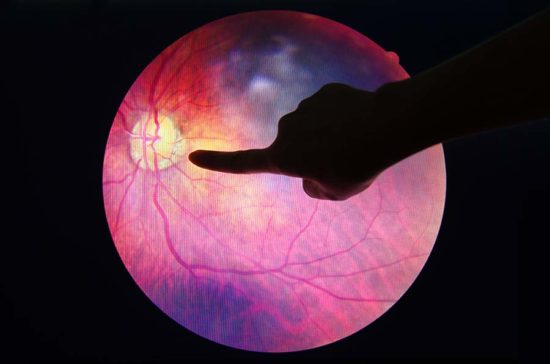December is Give the Gift of Sight Month - click here for FREE healthy vision tips
Menu

Approximately 15 million people in the United States suffer from Age-Related Macular Degeneration (AMD), and more than 1.7 million Americans have the advanced form of the disease. It is the most common cause of vision loss among the aging population.
While there’s no medical “cure” for AMD, current research has revealed that specific nutrients could help prevent and even reverse the progression of AMD, preserving the vision of millions of aging individuals.
AMD stands for Age-Related Macular Degeneration, and it is an eye disease that is common in older individuals. It causes central vision loss due to damage to a part of the retina called the “macula.”
Dry Macular Degeneration, the most common type of AMD, involves a deterioration of the center of the retina that progresses slowly over many years and is treatable with supplementation as well as other methods. Wet Macular Degeneration, meanwhile, is caused by leaky blood vessels growing under the retina; it has a much faster onset and can cause a relatively sudden loss of vision, requiring immediate medical attention and likely surgery or laser treatment.
AMD is characterized by a gradual loss of central vision, which can express itself as blurry or reduced quality image in the center of your vision. If left untreated, it can progress to even greater central vision loss. While not total blindness, the loss of central vision does lead to a blind spot in the center that affects the ability to see fine details and complete tasks that involve reading.
Dry Macular Degeneration symptoms typically develop slowly and painlessly. They can include:
AMD can affect one or both eyes. If just one eye is affected, it may be hard to observe any changes to your vision due to your good eye compensating for the weak eye. Since AMD doesn’t affect peripheral vision, it rarely causes total blindness.
AMD is caused by damage over time to a part of the retina called the “macula,” which is why it is most common in aging adults and the elderly. Despite its slow onset, AMD is the leading cause of vision loss among those over 60.
Factors that may increase your risk of macular degeneration include:
While there is no cure for AMD, there are medical treatments that can help slow down the progression of AMD before you lose too much of your vision
Allopathic Treatment options for Wet Macular Degeneration include specialized drugs, laser therapy, and surgery however the success rate is less than satisfactory. Ophthalmologist’s themselves are frustrated with the limitations of effective treatment options for this dreaded condition.
For Dry Macular Degeneration (the most common form of AMD), there aren’t many medical treatment options available. The only recommended treatment options are lifestyle changes, like a diet rich in colorful fruits & veggies and not smoking, or over-the-counter solutions like medicated eye drops and supplements (which include specific vitamins, minerals, and antioxidants such as Vitamin E, Zinc, Selenium, and L-Carnosine).
Certain vitamins, minerals, and antioxidants have been shown to be effective for AMD treatment and prevention. Much in the way that eating foods rich in these nutrients can help improve eye health, supplementation can lead to even more targeted results.
In a breakthrough study – Effects of melatonin in age-related macular-degeneration (Yi C, Pan X, Yan H, Guo M, Pierpaoli W. Ann N Y Acad Sci. 2005 Dec;1057:384-92), Dr. Yi Chang, an expert in retinal research, discovered that patients with both dry and wet forms of Macular Degeneration exhibited dangerously low levels of natural melatonin production. He explained that Melatonin is synthesized by the retina before being utilized by the rest of the body. Additionally, it was stated that the only time the Macula heals and repairs itself is during the deep REM state of sleep. His published study with Dr. Walter Pierpaoli revealed that by re-establishing proper melatonin levels the retina was able to effectively heal and repair itself.
His research resulted in the development of an exclusive retinal support formulation called ARMeD™
Wise Choice Medicine’s ARMeD™ Advanced Retinal Support supplement was designed specifically to support and restore optimal retinal health with AMD in mind. Composed of a unique organic Melatonin that is bonded with Selenium and Zinc, it effectively promotes healing and repair, protecting the eye from the damage caused by AMD and other common eye diseases.
• ARMeD™ contains a unique Melatonin from organic, pharmaceutical-grade, plant-based ingredients, bonded with Selenium and Zinc. It acts as a powerful antioxidant and protects the tissues of the eye. Melatonin also helps regulate immunological hormone functions to ensure optimal eye healing and repair.
• ARMeD™ facilitates the body’s natural healing process by improving the body’s natural and optimal night-peak release of Melatonin. This bonded melatonin formula, when taken nightly, was found to re-establish optimal circadian rhythms, resulting in healing and repair response in the eyes, as well as protecting the retinal epithelium (RPE) from oxidative damage.
• Melatonin controls eye pigmentation, which regulates the amount of UV light reaching the photoreceptors of the eyes. The macular pigment contributes to the protection of the retinal cells from free radicals caused by stress and the sun’s UV radiation.
Our Macular Degeneration Standard Program provides a 6-month supply of ARMeD™ for long-term protection from the risk of vision loss. Our Advanced Macular Degeneration Program includes Can-C™ Eye Drops and Nac-C™ Plus Capsules and when combined with ARMeD form a powerful triad of ocular nutrients for those with more advanced AMD or with multiple eye conditions.
Healthy eyes contain high levels of the natural antioxidant L-Carnosine. Interestingly, the eyes of those suffering from degenerative ocular diseases such as Macular Degeneration were found to be highly deficient in L-Carnosine. Can-C™ Eye Drops provide the eye with L-Carnosine, acting as a natural and highly effective antioxidant that protects and heals the eye to provide targeted support for those who suffer from Macular Degeneration.
Nac-C™ Plus Capsules enhance the effectiveness and duration of Can-C™ Eye Drops’ activity in the eye, thereby speeding up the healing response and reducing oxidation in the eyes. These capsules include specific antioxidants, and amino acids that have been clinically proven to target retinal health and facilitate a healing response in the eyes of Macular Degeneration patients.
Macular Degen. Standard Program
6 month supply
Comprehensive program for accelerated results
$100.47 one-time or
$95.45 every 6 months
Macular Degenerat. Advanced Program
1.5 month supply
Comprehensive program for accelerated results
$105.70 one-time or
$100.42 every 6 weeks
Free shipping on all US orders
Your data is safe
Satisfaction guaranteed
Email support is always available

*Disclaimer: The above statements have not been evaluated by the FDA. They are not intended to diagnose, treat, cure or prevent any disease or condition.
If you have a health condition or concern, consult a physician or your alternative health care provider.
Always consult a medical doctor before modifying your diet, using any new product, drug, supplement, or doing new exercises.
Use of this site constitutes acceptance of our Shipping and Returns Policy, our Terms and Conditions and our Privacy & Cookies Policy
| Cookie | Duration | Description |
|---|---|---|
| cookielawinfo-checkbox-analytics | 11 months | This cookie is set by GDPR Cookie Consent plugin. The cookie is used to store the user consent for the cookies in the category "Analytics". |
| cookielawinfo-checkbox-functional | 11 months | The cookie is set by GDPR cookie consent to record the user consent for the cookies in the category "Functional". |
| cookielawinfo-checkbox-necessary | 11 months | This cookie is set by GDPR Cookie Consent plugin. The cookies is used to store the user consent for the cookies in the category "Necessary". |
| cookielawinfo-checkbox-others | 11 months | This cookie is set by GDPR Cookie Consent plugin. The cookie is used to store the user consent for the cookies in the category "Other. |
| cookielawinfo-checkbox-performance | 11 months | This cookie is set by GDPR Cookie Consent plugin. The cookie is used to store the user consent for the cookies in the category "Performance". |
| viewed_cookie_policy | 11 months | The cookie is set by the GDPR Cookie Consent plugin and is used to store whether or not user has consented to the use of cookies. It does not store any personal data. |
Any questions? We’re here to help.